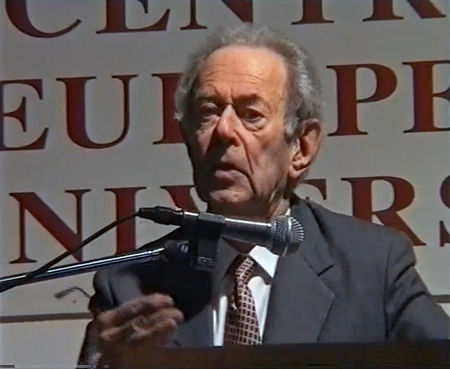János Kornai (1928–2021) was an internationally acclaimed expert of Socialist economies and post-Communist transitions. His professional correspondence now donated to the Blinken OSA Archivum, spanning from the 1960s to the 2010s and covering the entire globe, will serve as a fundamental resource for economic research and for the future János Kornai Research Institute.
János Kornai, born in 1928, became a devoted communist after losing his father and brother to the Holocaust and being himself liberated by the Soviets in Budapest. By 1956, however, he had become a critic of the regime, addressing, as an emerging economist, the systemic flaws of planned economies. After the Hungarian Revolution of 1956, he was sidelined, and could return to academia only at the second half of the 1960s.
Once he was allowed to, Kornai continued to uncover the structural defects of Eastern Bloc economies, publishing defining books, such as Economics of Shortage (1980), The Socialist System, The Political Economy of Communism (1988), and, with the Socialist regimes collapsing in Eastern Europe, The Road to a Free Economy (1990). By this time, he was an internationally renowned scholar; a member of the Hungarian Academy of Sciences, a professor at the Harvard University economics department and visiting professor at many other Western universities, and one of the few foreign experts invited to China in 1985 to contribute to the reforms there. Before his death in 2021, Kornai became Emeritus Professor at Harvard University and at Corvinus University of Budapest, Distinguished Research Professor at the Central European University, and member of the National Academy of Sciences and the Royal Swedish Academy of Sciences.
Donated to the Blinken OSA Archivum, Professor Kornai’s correspondence reflects his career from the 1960s to the 2010s, covering the entire globe from Hungary to the US and to China. Throughout the decades, the records change from hand- and typewritten letters to fax messages and eventually to printed e-mails, with letterheads capturing Kornai’s course from the Hungarian Academy of Sciences to Harvard University and to Collegium Budapest Institute for Advanced Study. His correspondents include Eastern Bloc politicians and economists Rezső Nyers, Stanisław Gomułka, Włodzimierz Brus, or Grzegorz Kołodko, Nobel Prize laureates in economics Richard Stone, Tjalling Koopmans, or Leonid Kantorovich, renowned scholars like Edmond Malinvaud, Lionel W. McKenzie, Alec Nove, or Xu Chenggang and Dong Fureng, as well as a variety of universities, financial research institutes, and banks. Besides containing personal messages and scholarly discussions with fellow researchers and former students, the donation will help reconstruct Kornai’s career in Hungary as well as in the international arena through conference and scholarship invitations and letters of recommendation he received or wrote, internal institutional communications, or negotiations with journals and publishing houses.
Recently, in June 2023, marking the 95th anniversary of Kornai’s birth, the CEU Democracy Institute, Corvinus University of Budapest, and Harvard University organized a conference bringing together different generations of scholars. Beyond exploring “how his life’s work can be applied to understanding today’s complex problems and finding solutions, from the climate catastrophe to the role of the internet and the background to Russian military spending,” the symposium also laid the foundations for a future János Kornai Research Institute in Budapest, Hungary.
Image: János Kornai delivers honorary doctoral lecture at CEU in 2004.
(HU OSA 203-13-1 Records of Central European University, Audio-visual Recordings)


